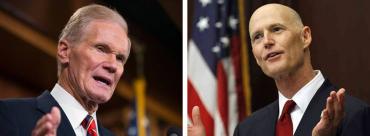
A new poll shows a potential political main event in Florida is within the margin of error as Gov. Rick Scott considers challenging U.S. Sen. Bill Nelson, D-Fla., next year.
St. Leo University released a poll on Tuesday showing Nelson getting 38.7 percent of Floridians while Scott pulls in 34.4 percent of them, just within the poll’s 4.5 percent margin of error. While 10 percent of those surveyed back other candidates, 17 percent of Floridians are undecided. Also on Tuesday, St. Leo unveiled a poll showing a majority of Floridians approving of Scott’s tenure in Tallahassee.
There have been three other polls released this month which show Nelson ahead by single digits but neither he nor Scott can claim a majority of voters. On Monday, the Florida Chamber of Commerce released a poll showing Nelson ahead 48 percent to 42 percent. Earlier this month, Mason-Dixon had Nelson with 46 percent while Scott took 41 percent. A poll from the University of North Florida had Nelson up 44 percent to 38 percent.
On Tuesday, St. Leo University released a poll showing Scott with a clear lead with Florida Republicans. Scott takes 45 percent of Florida Republicans while a quarter of them--26 percent--are undecided. U.S. Rep. Tom Rooney pulls 10 percent while 7 percent back U.S. Rep. Ron DeSantis who briefly ran for the Senate last year before U.S. Sen. Marco Rubio decided to run for another term. Two other Republicans who pulled out of the Senate race when Rubio announced he would run again were also included in the poll. Former U.S. Rep. David Jolly, who was unseated in November by former Gov. Charlie Crist, takes 5 percent while Lt. Gov. Carlos Lopez-Cantera gets 1 percent. Seven percent of Florida Republicans are for other candidates.
Frank Orlando, the director of the Saint Leo University Polling Institute, said Scott was in good shape to win the Republican nomination.
“Rick Scott starts off as the strong favorite to win the GOP nomination but it’s important to remember that Charlie Crist was once considered a shoe-in for the Republican nod in 2010,” Orlando said.
“Scott’s lead right now relies mainly on a name ID advantage, but the better the state is doing the better position he’ll be in,” Orlando continued. If he does win the primary, he’ll have his work cut out for him against incumbent Bill Nelson, who will also have the advantage of running against the president’s party in a midterm election.”
The poll of 507 Floridians was conducted with an online survey instrument from March 3-11 and had a margin of error of +/- 4.5 percent.


